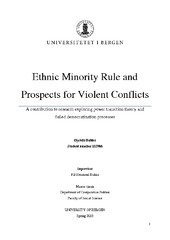| dc.description.abstract | Abstract In our age of democratization, ethnic minority rule is regarded as one of the least legitimate form of governance. Authoritarian regimes headed by ethnic minorities are thus targeted by promoters of democracy attempting to ignite transitions of power. However, power transitions are characterized by periods of political instability, which, if allowed to turn violent, may thwart well-intended democratic incentives. This thesis explores the nature of ethnic minority rule, and subsequently, discusses the potential of the onset of violent conflict caused due to this distinctive form of governance. The thesis is conducted by means of literature review, initially, by giving an account of ethnic conflict theory, followed by a description of ethnic minority rule and the prevalence of such. This account constitutes a solid foundation on which I seek to base my principal discussion of the extent to which ethnic minority regimes represent an increased risk of violent outbreak when threatened by power transition. I conduct the discussion by combining recognized theories with more recent empirical findings. Although well regarded theories seem to support a positive relation between ethnic minority rule and violent conflict onset, the relation is not, per se, supported by empirical studies. Rather than giving explicit support to the hypothesis in question, my thesis suggests a significant relation between the relative size of the ethnic group in power and the excluded rest". The findings assume more conflict outbreaks, characterized by higher intensity, as the size of the ethnic group in power decreases. My thesis further highlights distinctive characteristics of both the ruling elite and the excluded party which causes increased risks of violent outbreaks. In this regard, the most significant features appear to be related to the level of cohesion and experiences of resent loss of power amongst the excluded party. In the final chapter I relate my findings to the practical work of policy makers and democracy promoters, encouraging further efforts to increase the size of ruling coalitions. | en_US |
